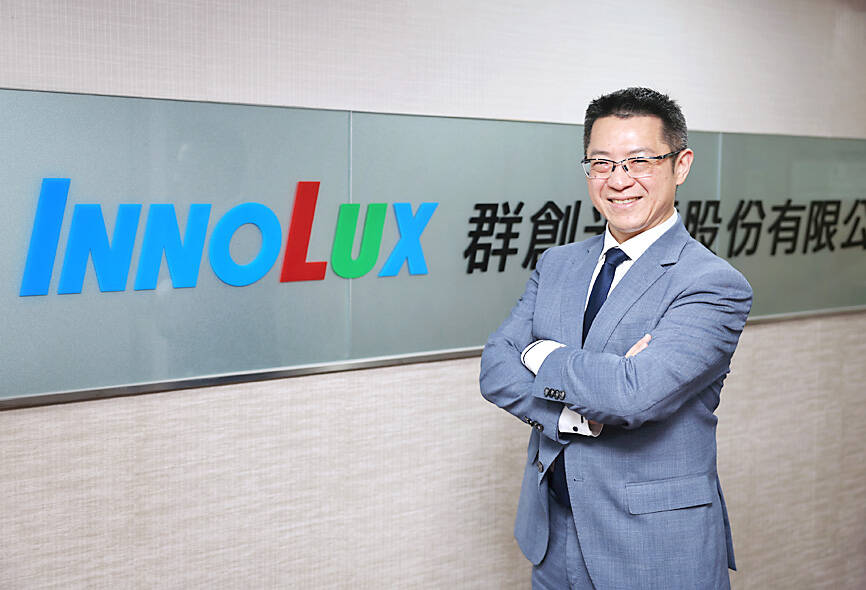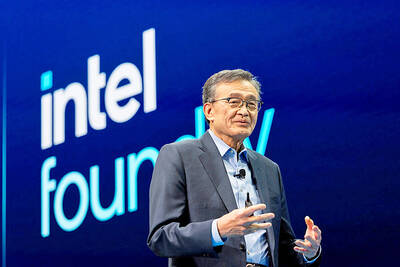Innolux Corp (群創) yesterday said it is shutting down a plant in Tainan, as the flat-panel display maker shifts its focus to non-display business and seeks to rejuvenate low-utilized assets.
“The company is adjusting its capacity structure to match market dynamics,” Innolux said in a statement. “The arrangement aims to cope with market changes and expansions in non-display business, as the company continues to allocate resources to segments with long-term growth potential.”
Innolux plans to move the Tainan plant’s manufacturing equipment used to produce displays for notebook computers, monitors and medical devices to other plants in Taiwan. The company dismissed media report that it planned to complete the integration by the middle of next year.

Photo: CNA
Innolux did not disclose further details about whether it is in talks with potential buyers to take over the facility, a 5-generation flat panel display plant.
The company last year sold an idled 5.5-generation plant, also in Tainan, to Taiwan Semiconductor Manufacturing Co (TSMC, 台積電) for NT$17.14 billion. TSMC is planning to convert the plant into an advanced chip-on-wafer-on-substrate (CoWoS) packaging facility.
Innolux is aggressively diversifying its business coverage to new areas beyond the boom-and-bust display market. Non-display business makes up about 30 percent of its revenue, the company said.
The company is tapping into chip fan-out panel-level packaging market by converting a less-advanced 3.5-generation plant in Tainan into a chip packaging facility for power management chips and radio frequency chips, with production projected to ramp up in the second half of this year following several delays.

Mercuries Life Insurance Co (三商美邦人壽) shares surged to a seven-month high this week after local media reported that E.Sun Financial Holding Co (玉山金控) had outbid CTBC Financial Holding Co (中信金控) in the financially strained insurer’s ongoing sale process. Shares of the mid-sized life insurer climbed 5.8 percent this week to NT$6.72, extending a nearly 18 percent rally over the past month, as investors bet on the likelihood of an impending takeover. The final round of bidding closed on Thursday, marking a critical step in the 32-year-old insurer’s search for a buyer after years of struggling to meet capital adequacy requirements. Local media reports

TECHNOLOGICAL RIVALRY: The artificial intelligence chip competition among multiple players would likely intensify over the next two years, a Quanta official said Quanta Computer Inc (廣達), which makes servers and laptops on a contract basis, yesterday said its shipments of artificial intelligence (AI) servers powered by Nvidia Corp’s GB300 chips have increased steadily since last month, should surpass those of the GB200 models this quarter. The production of GB300 servers has gone much more smoothly than that of the GB200, with shipments projected to increase sharply next month, Quanta executive vice president Mike Yang (楊麒令) said on the sidelines of a technology forum in Taipei. While orders for GB200 servers gradually decrease, the production transition between the two server models has been

US sports leagues rushed to get in on the multi-billion US dollar bonanza of legalized betting, but the arrest of an National Basketball Association (NBA) coach and player in two sprawling US federal investigations show the potential cost of partnering with the gambling industry. Portland Trail Blazers coach Chauncey Billups, a former Detroit Pistons star and an NBA Hall of Famer, was arrested for his alleged role in rigged illegal poker games that prosecutors say were tied to Mafia crime families. Miami Heat guard Terry Rozier was charged with manipulating his play for the benefit of bettors and former NBA player and

BETTER THAN EXPECTED: The firm’s Q3 results exceeded its projections, based on ‘the underlying strength of our core markets,’ chief financial officer Dave Zinsner said Intel Corp returned to profitability and gave an upbeat revenue forecast after PC demand grew, suggesting that it is making progress on a long and challenging comeback attempt. In the third quarter, revenue rose 3 percent to US$13.7 billion. The Santa Clara, California-based company posted its first quarterly net income since the end of 2023, with earnings per share of US$0.23, excluding some items. Analysts had estimated sales of US$13.2 billion and earnings per share of US$0.01 on average, according to data compiled by Bloomberg. Fourth-quarter sales would be roughly US$13.3 billion, the company said in a statement on Thursday. Intel shares gained about